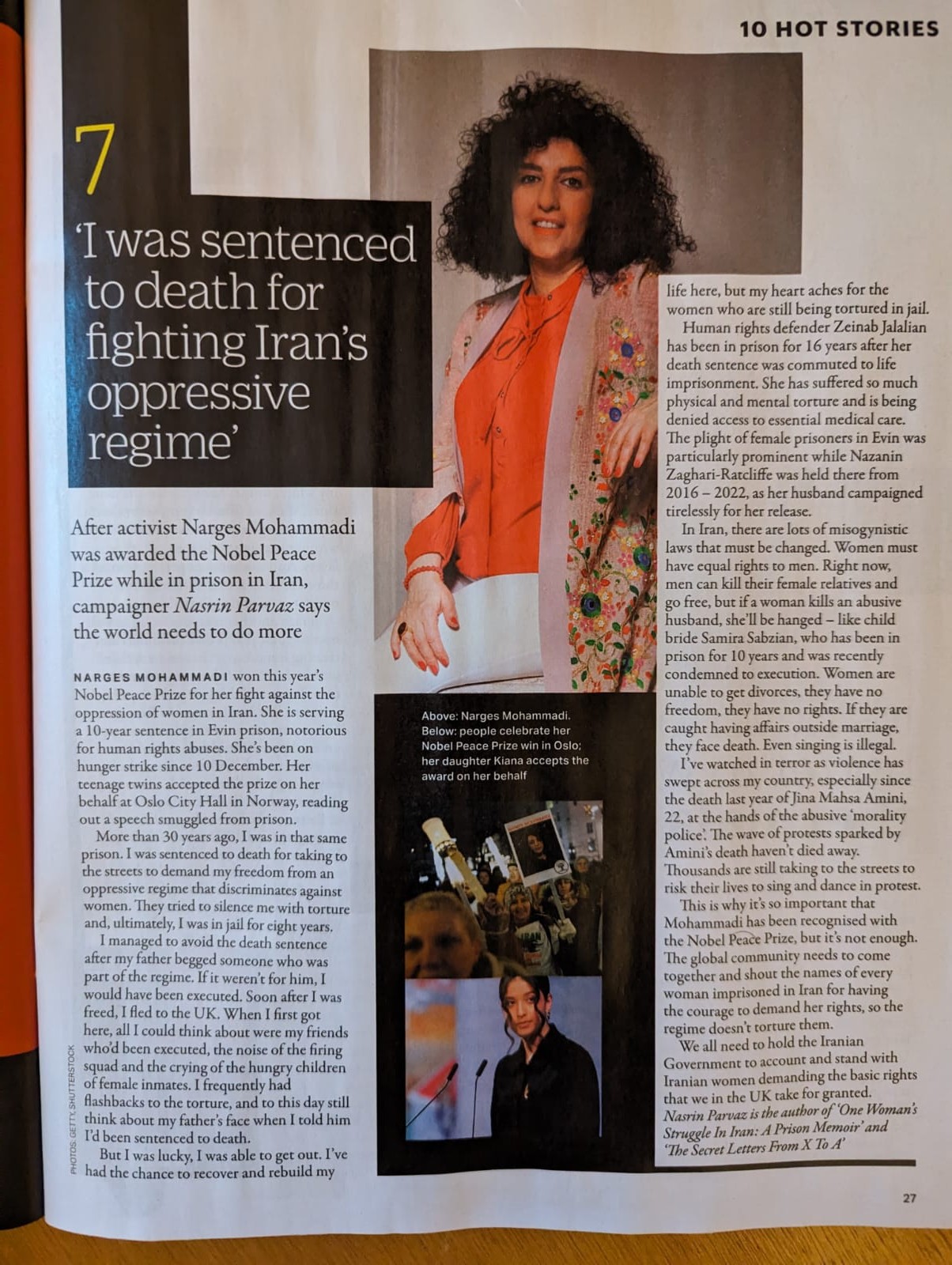
Source: Grazia magazine

Source: Grazia magazine
More than thirty years ago, I suffered terribly at the hands of the Iranian government. I was imprisoned for eight years, and they tried to silence me with torture. All I’d done was take to the streets to demand my freedom and liberty from an oppressive and authoritarian regime.
The torturers tried to take my voice away. And therapy, writing and art played a vital role in helping me to express myself again. When I first came to the UK, after leaving my friends and family behind, I felt lost. But I was given support by organisations like Freedom from Torture that had a transformative impact on my life. I joined Write to Life, a creative writing group for survivors of torture. Through writing I regained my voice.
For many years writing was a means of escape for me. But art opened my eyes and I realised that it could be a way of fighting back, as well as a means of change. It can provide a counterpoint to what those in power and their media are showing to people. Art can change people’s minds. That’s why art is seen as a threat to power. Look how many artists are imprisoned in Iran from rappers, like Toomaj Salehi, to film makers and other artists.
Sharing my story through writing, and now through my art, is such a powerful way to tell difficult stories. It can give such an important insight into the very painful realities faced by those of us who’ve experienced torture. Today, I’m a member of Survivors Speak OUT (the UK’s torture survivor-led activist network) and I can raise awareness of the horrors happening in Iran. Being able to do this has helped give my life meaning since I had to leave my home.
I’ve listened and watched in terror at the violence that has swept across my country, since the death of 22-year-old Jina Mahsa Amini at the hands of the abusive “morality police” in September 2022. Although media interest is disappearing, the wave of protests sparked by Amini’s death haven’t died away, they’ve just changed. Instead of thousands taking to the streets, young people gather to dance, and women risk their lives and liberty just to sing.
Now, things like street dancing, singing, paintings and music are such an important way for people in Iran to protest. Many forms of art – like songs, digital art, videos, graffiti – have been created during the Woman, Life, Freedom revolution. Each of them emphasises protest actions, resistance, and different forms of activities against the regime’s repressive system. My own work explores personal and political journeys based on both my life and collective experiences that I have witnessed and heard about.
At first, I only wanted to show what had happened in prison, but now I have so many other ideas, I don’t have enough time to paint them all. My work explores the vulnerabilities of humans, of issues like refugee and women’s rights. I try and capture this in my work, regardless of the media I use, through drawing, painting, sculpture or print making.
When I first got to the UK, my head was full of the scenes of prison. All I could think about were the faces of my friends who’d been executed, the noise of the firing squad and the crying of hungry children in the prison, the torture that we experienced, and the face of my father when I told him I’d been sentenced to death. Therapy helped me to slowly clear these images from my head, and over time, I was able to feel safe and strong again.
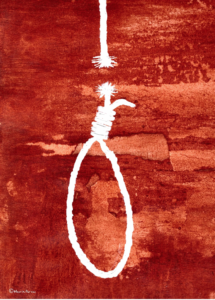
Still so many people in Iran have been imprisoned, they’ve been tortured and are languishing in prisons. I was lucky, I was able to get out. I’ve had the chance to recover and rebuild my life here in the UK. But my heart aches for the women who are still being subjected to the same kind of torture that I was. It’s horrific and depressing that this is still happening.
Iran is one of the top countries of origin of Freedom from Torture’s clients. There are many people like me who have fled their homes and reached the UK hoping just to live in safety. The therapists, lawyers and welfare advisors offer a lifeline to people who crucially need compassion, support and rehabilitation to recover.
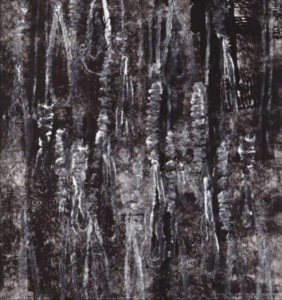
Those in power in Iran now will do anything to try and suppress any opposition. Ex-prisoners, families of those still imprisoned, or anyone remotely politically active are being threatened and intimidated by security forces. It’s just more abuse carried out by an authoritarian regime that will stop at nothing to eradicate any form of defiance.
We need to continue to stand shoulder-to-shoulder with the women and young people demanding the basic rights that we, in other parts of the world, take for granted and enjoy every single day. I’m calling on the international community and media to keep shining a spotlight on my country to demand that the regime stop using torture immediately.
Nasrin Parvaz became a civil rights activist when the Islamic regime took power in 1979. She was arrested in 1982, tortured and imprisoned for eight years. Parvaz is the author of One Woman’s Struggle in Iran: A Prison Memoir and The Secret Letters from X to A.
Article originally appeared on Huckmag.
En 1979, Nasrin Parcaz regresó a Irán desde Inglaterra, donde había ido a estudiar, y se hizo militante de un partido socialista que luchaba por un estado no islámico. Tres años más tarde, a la edad de 23, Nasrin fue detenida por la policía secreta del régimen islámico. Durante los ocho años que siguieron, estuvo prisionera recintos del sistema penal iraní.
Yo no me quiebro es un testimonio de lo que tuvo que sufrir durante esos ocho años.
https://www.victorinapress.com/product/yo-no-me-quiebro-memorias-de-una-presa-politica-irani/
During the 2017 uprising in Iran a participant named Asghar Haron Alrashidi was killed by a bullet fired by a government guard.
His family complained against the government militias. Soon after a number of his friends were arrested. They were forced to falsely confess to the use of arms in what was a peaceful demonstration under torture by the hands of Islamic Guards. The regime used these confessions against them to condemn them to execution.
These five men are sentenced to ten executions for the crime of protesting against the regime – yes, each of them is sentenced to two executions each. Their death sentence has been issued by the Supreme Court.
One thing that the Iranian regime does not like is international publicity that shows them for what they are. Please sign this petition to stop the regime from carrying out these executions.
Hadi Kiani was born in 1990 and is married.
Abass Mohammadi was born in 1991 and has two children.
Mohammad Bastami was born in 1992 and is married.
Majid Nazari Kondori was born in 1994.
Mehdi Salehi Ghaleh Shahrokhi was born in 1983 and has a seven year old daughter.
During the last three years there have been bursts of peaceful demonstrations in Iran. What people want is their basic rights: freedom of expression, jobs and unemployment benefits, and the end of execution. The regime shot demonstrators and arrested thousands of them before killing them in prison. Please sign this petition to stop the execution of these young men.
Just to say a couple of sentences about myself: I was arrested three years after the Islamic regime took power in the early 80s for the same reasons that these young men revolting against the regime. I was tortured and sentenced to execution, but after a year and half my late father was able to change my fate. I was released from prison after eight years. Now I’m a refugee living in the UK.
Inside Stories: stories of resilience during the pandemic is a series of conversations with people who have been displaced by war, conflict or persecution about their lives, thoughts and hopes for others.
As a young woman in post revolutionary Iran, Nasrin Parvaz was arrested for her political activism and spent the next eight years in Iran’s prisons. The brutality of the prison regime, her friendship with her fellow women prisoners and their children, and the unexpected glimmers of joy and humour are captured in her book, One Woman’s Struggle in Iran: a prison memoir. Nasrin was granted protection in the UK in 1993 and is an author and artist. She continues to campaign for justice and is an active members of Survivors Speak Out at Freedom from Torture.
A few weeks into the lockdown, we asked Nasrin what has happening in her life, what was on her mind and what message she might have for others.
“My life hasn’t changed much. Due to epilepsy, which I developed as a result of having my head bashed against walls in prison, my social life had become limited the last few years even before the pandemic; that means I couldn’t do the activities I would have liked. So my life was mostly dedicated to writing and recently to art. Now with the lockdown, that little social life that I had is gone and I’ve missed it, but I’m in touch with friends by phone. I’m very grateful that my editor has finished editing my most recent novel during the lockdown and with that aside, I now have other unfinished books to work on, and I continue my art classes on Zoom to improve my painting.
However I’m aware that this situation is very hard for people who have lost their loved ones, or for those who lost their jobs and don’t have a secure future. At the same time there is money available, it’s just not given to those who need it, and this hurts me. Especially when everyone had to stay at home and look after themselves and the construction workers still had to work. A friend of mine who had done many different jobs and who is a construction worker, worked until he dropped to the floor with the coronavirus and was under ventilation for 12 days. When he came out of the ICU the nurses clapped for him, saying he fought for his life. He had no energy to tell them that they had saved his life.
Once more this situation has reminded me that my struggle for justice was right and that I have to continue. Last year there were multiple floods in Iran that made so many people homeless. Flooding also happened in numerous other countries and it only makes the poor poorer, whilst the rich, whose companies heat up the earth producing useless goods, get richer.
The situation reminds me of prison, but not solitary confinement where I was deprived of being able to see anyone for days and nights for months. It reminds me of times that we prisoners were together or in different rooms, but had no right to talk to each other. We would be tortured if we did. Yet the guards could not read our eyes and a glance at my cellmate meant I had written a letter for her. We had secret places where we used to hide our letters. When another friend of mine hung her blue shirt on the washing line, I knew she was telling me that she had hidden a letter for me. An ordinary book would be a cover for our little letters to read under the guard’s nose. Just as we found new ways to communicate in prison, we are now using social media to be in touch with each other.
I hope this situation opens our eyes and people try to change the world for a better future. I’m worried that big pharma may attempt to capitalise on the importance of the virus and extort people by profiting on the price of the vaccine.
Nasrin Parvaz, June 2020
One thing that kept me going in prison was the belief that the situation will pass. I believed nothing was permanent and it’s the same with this situation we’re living in now. One day this virus will disappear. But I hope this situation opens our eyes and people try to change the world for a better future. It makes me sad that all the production is for profit rather than for people’s benefit – and everywhere people become poorer and a select few get all the wealth with the help of the system and army that they have made to protect themselves. I’m worried that big pharma may attempt to capitalise on the importance of the virus and extort people by profiting on the price of the vaccine if it is successfully developed.
I also hope all those polluting cars won’t come back to the streets, and that there is a solution. If transport is public and free, not for profit, then people would not bring their cars to the street and the air wouldn’t get polluted: the earth would breathe rather than burn as it does now.
#CommunityAcrossDifferences #RefugeeAllies #InThisTogether #InsideStories
© Milan Svanderlik for www.LondonersAtHome.org
...And later in the notebooks, Xavar depicts the unbearable moment when Mahvash, who was like a mother to her in prison, was called by the guards for execution: “She kissed me and wished that I would ‘stay alive’ as she went. ‘Stay alive’ are the last words uttered by those who go to be executed to us who are still living. They are the same words, spoken in different accents and with varying degrees of fear, hesitation, anxiety, confusion, or even happiness that I have heard so many times here.” - Nasrin Parvaz
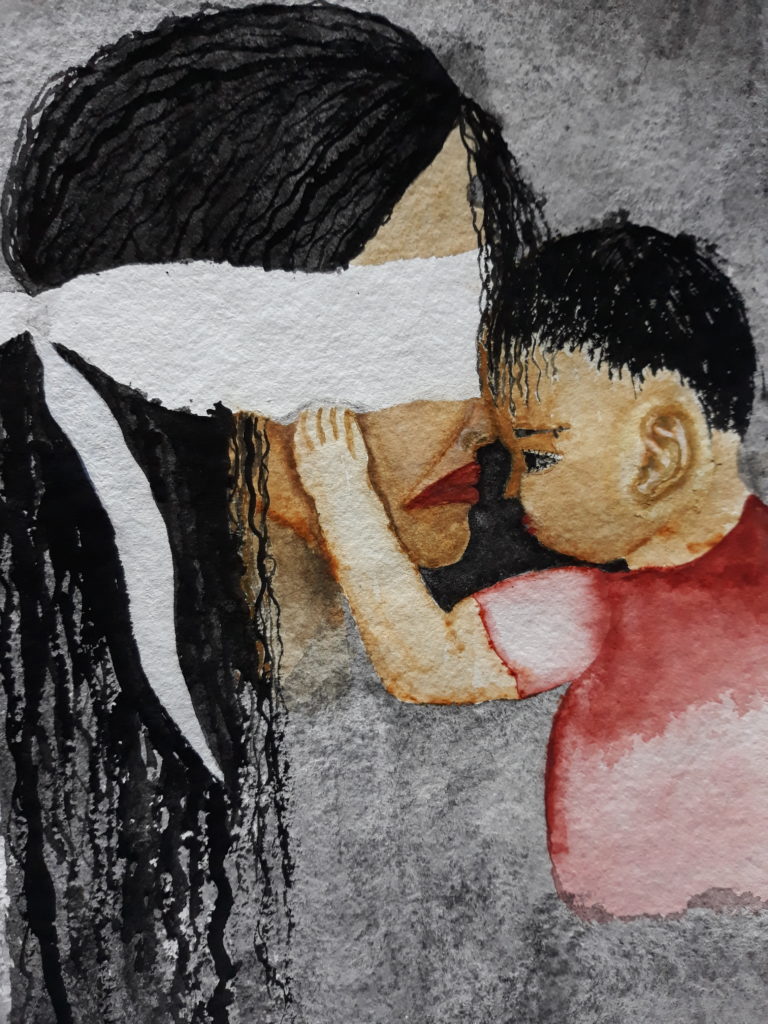 In 1979, Nasrin Parvaz returned from England, where she had been studying, and became a member of a socialist party in Iran fighting for a non-Islamic state in which women had the same rights as men. Three years later, at the age of 23, she was betrayed by a comrade and arrested by the regime’s secret police.
In 1979, Nasrin Parvaz returned from England, where she had been studying, and became a member of a socialist party in Iran fighting for a non-Islamic state in which women had the same rights as men. Three years later, at the age of 23, she was betrayed by a comrade and arrested by the regime’s secret police.
(Hardcopy and Paperback)
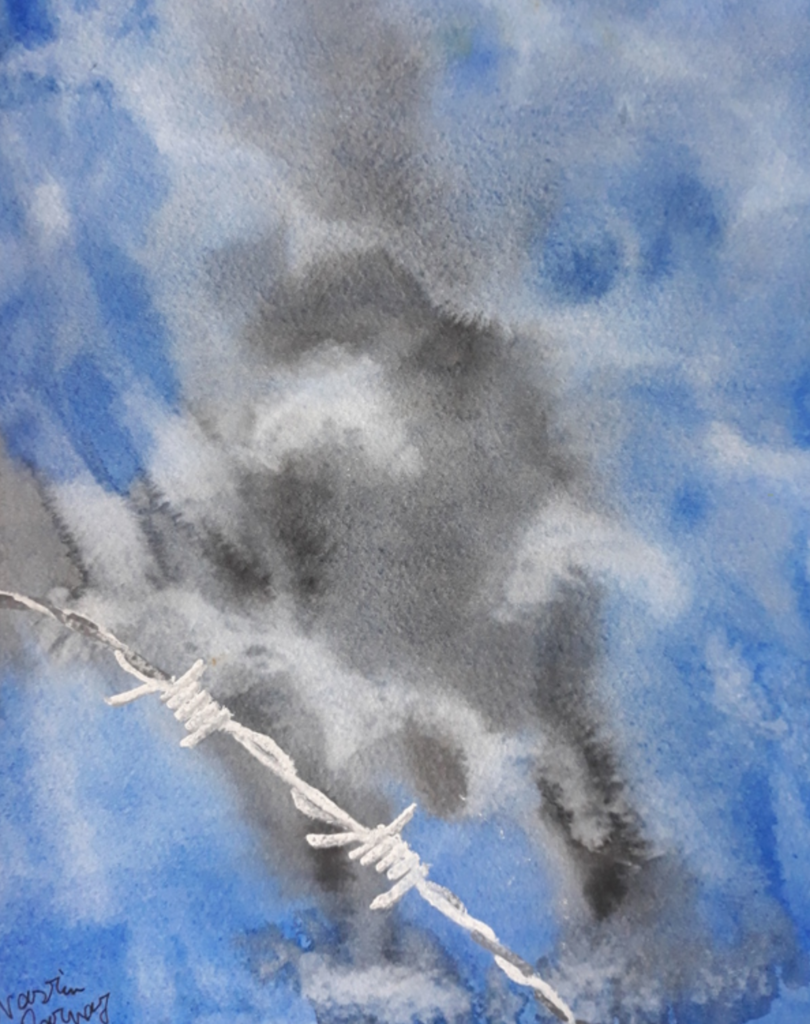 “For those of you who weren’t able to see it, it was an exhibition of paintings by foreign national prisoners and ex-prisoners, taken from a variety of sources. The exhibition was on display from the 1st to the 7th of May, and was opened by our MP, Rosie Duffield.”
“For those of you who weren’t able to see it, it was an exhibition of paintings by foreign national prisoners and ex-prisoners, taken from a variety of sources. The exhibition was on display from the 1st to the 7th of May, and was opened by our MP, Rosie Duffield.”
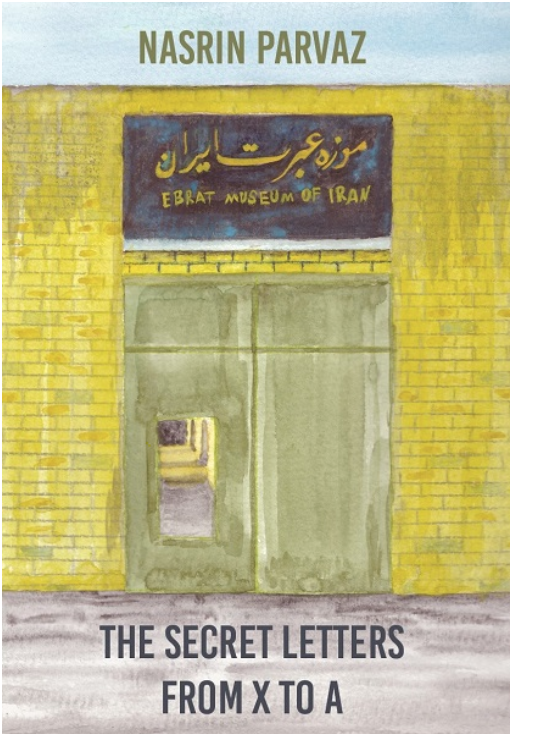
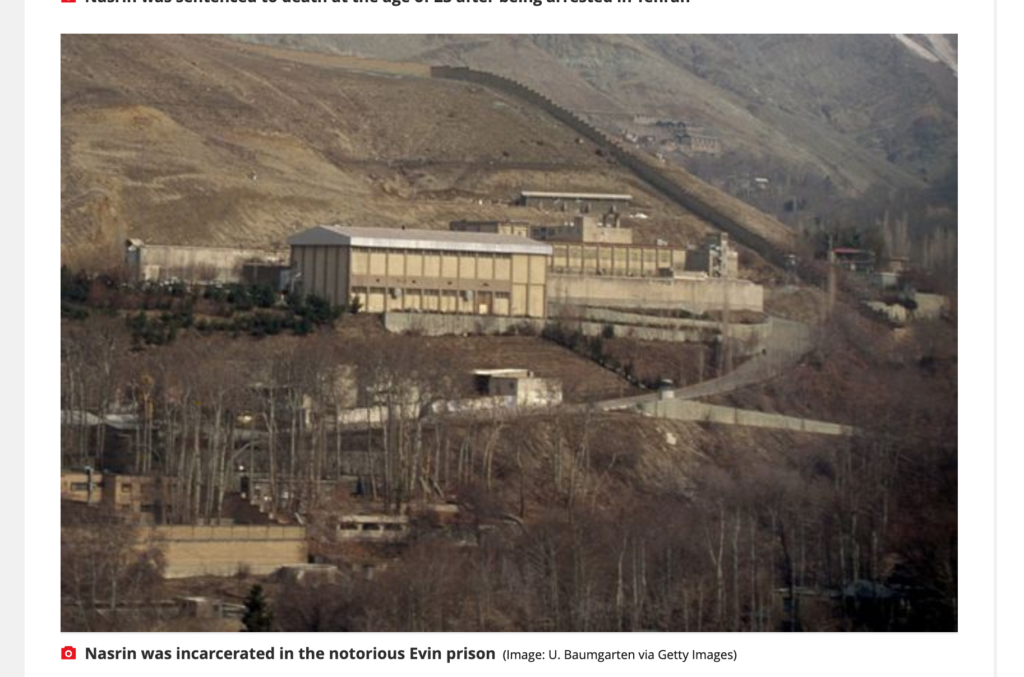
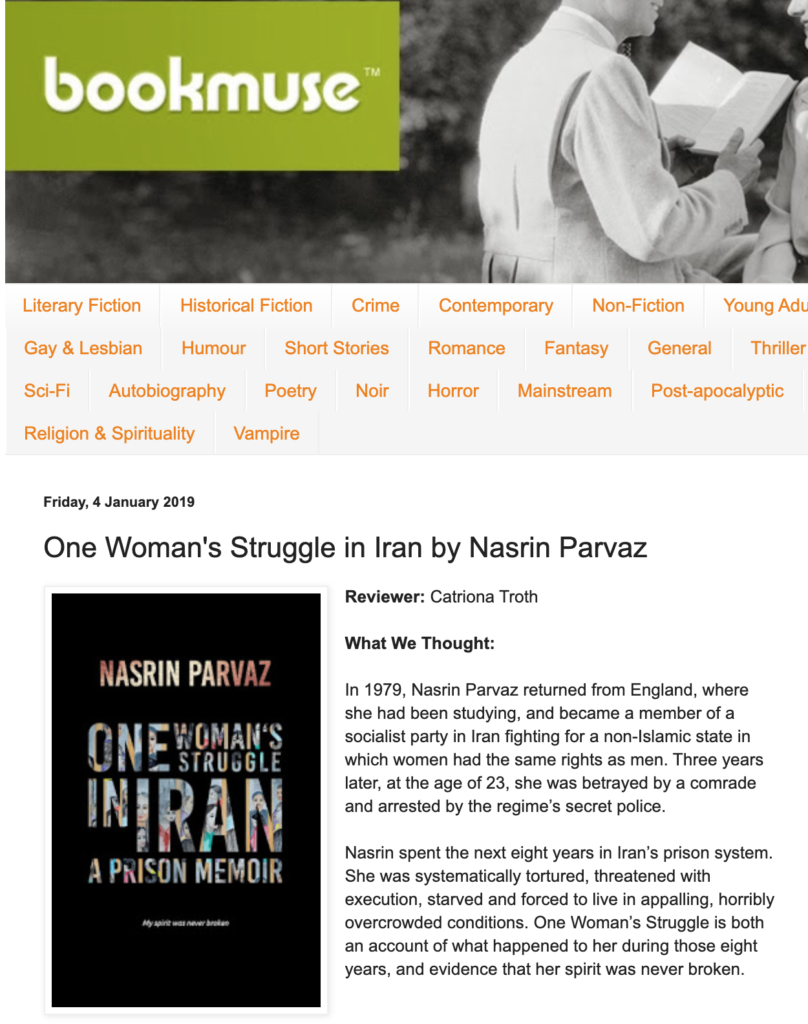 “Nasrin gives a frank account of her time in Iran’s prison system which has opened my eyes to the extremes that can be endured and overcome. It is a testament to her resilience and that of others who remained resolute and refused to recant their beliefs. Nasrin survived and I celebrate her ability to share these experiences from which we can all learn. I recommend this memoir to you.”
“Nasrin gives a frank account of her time in Iran’s prison system which has opened my eyes to the extremes that can be endured and overcome. It is a testament to her resilience and that of others who remained resolute and refused to recant their beliefs. Nasrin survived and I celebrate her ability to share these experiences from which we can all learn. I recommend this memoir to you.”
In Tehran there is a historic circular building once known as the Joint Committee Interrogation Centre. Its designers were German, so the balcony railings were decorated with Nazi symbols. Reza Shah ordered it in 1932 and it was ready in 1937. Political prisoners were tortured there.
Copyright all rights reserved for the author and respectful publications.
by Catriona Troth
In 1979, Nasrin Parvaz returned from England, where she had been studying, and became a member of a socialist party in Iran fighting for a non-Islamic state in which women had the same rights as men. Three years later, at the age of 23, she was betrayed by a comrade and arrested by the regime’s secret police.
Continue reading One Woman’s Struggle in Iran; Interview With Parvaz
Nasrin Parvaz became a civil rights activist when the Islamic regime took power in 1979. She was arrested in 1982, tortured and spent eight years in prison. In 1993, she fled to England. Her prison memoir is being crowdfunded by Unbound publisher. Nasrin’s stories, poems, articles and translations appeared in Exiled Writers Ink; Modern Poetry in Translation series; Write to be Counted, Resistance Anthology 2017; Words And Women 2017; 100 poems for human rights 2009; Hafiz, Goethe and the Gingko 2015; Over Land, Over Sea, Poems for those seeking refuge 2015; A novel, Temptation, based on the true stories of some male prisoners who survived the 1988 massacre of Iranian prisoners was published in Farsi in 2008.